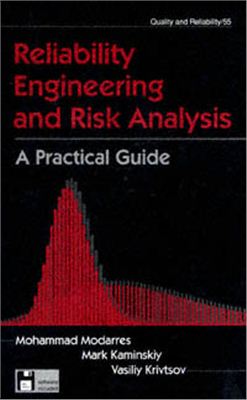Marcel Dekker, 1999. 542 p. ISBN: 0824720008, 0849392470
Tools to Proactively Predict Failure
The prediction of failures involves uncertainty, and problems associated with failures are inherently probabilistic. Their solution requires optimal tools to analyze strength of evidence and understand failure events and processes to gauge confidence in a design’s reliability.
Reliability Engineering and Risk Analysis: A Practical Guide, Second Edition has already introduced a generation of engineers to the practical methods and techniques used in reliability and risk studies applicable to numerous disciplines. Written for both practicing professionals and engineering students, this comprehensive overview of reliability and risk analysis techniques has been fully updated, expanded, and revised to meet current needs. It concentrates on reliability analysis of complex systems and their components and also presents basic risk analysis techniques. Since reliability analysis is a multi-disciplinary subject, the scope of this book applies to most engineering disciplines, and its content is primarily based on the materials used in undergraduate and graduate-level courses at the University of Maryland. This book has greatly benefited from its authors' industrial experience. It balances a mixture of basic theory and applications and presents a large number of examples to illustrate various technical subjects. A proven educational tool, this bestselling classic will serve anyone working on real-life failure analysis and prediction problems.
Tools to Proactively Predict Failure
The prediction of failures involves uncertainty, and problems associated with failures are inherently probabilistic. Their solution requires optimal tools to analyze strength of evidence and understand failure events and processes to gauge confidence in a design’s reliability.
Reliability Engineering and Risk Analysis: A Practical Guide, Second Edition has already introduced a generation of engineers to the practical methods and techniques used in reliability and risk studies applicable to numerous disciplines. Written for both practicing professionals and engineering students, this comprehensive overview of reliability and risk analysis techniques has been fully updated, expanded, and revised to meet current needs. It concentrates on reliability analysis of complex systems and their components and also presents basic risk analysis techniques. Since reliability analysis is a multi-disciplinary subject, the scope of this book applies to most engineering disciplines, and its content is primarily based on the materials used in undergraduate and graduate-level courses at the University of Maryland. This book has greatly benefited from its authors' industrial experience. It balances a mixture of basic theory and applications and presents a large number of examples to illustrate various technical subjects. A proven educational tool, this bestselling classic will serve anyone working on real-life failure analysis and prediction problems.

